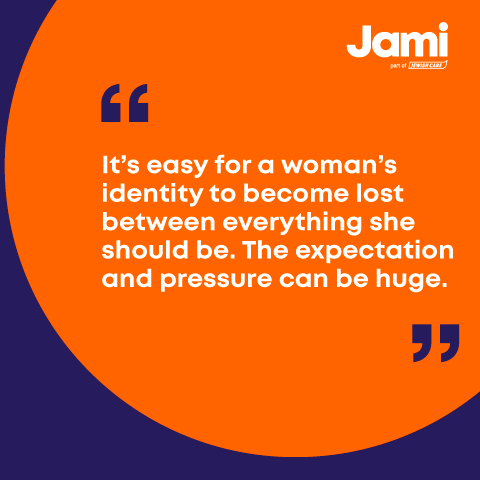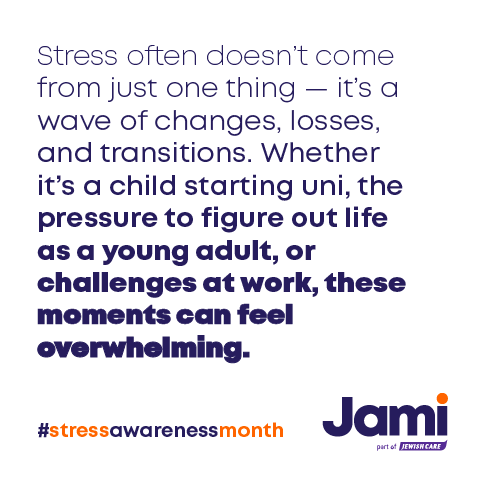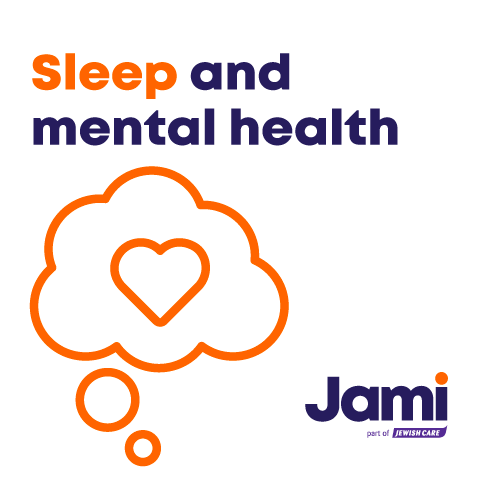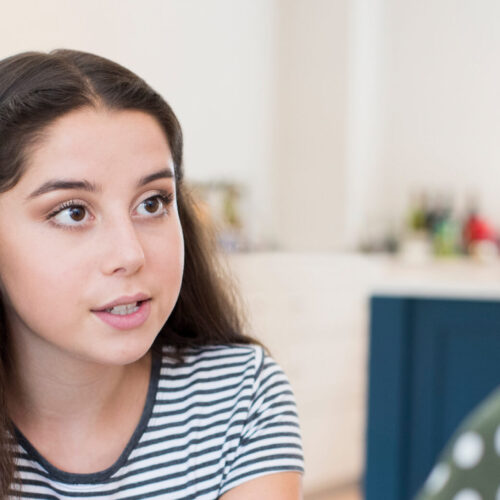
International Women’s Day is about all women – not just one experience, age demographic, or cultural, religious or faith background. To celebrate the diversity of women, Emma Dorman, Jami’s Senior Education Coordinator CYP Education Lead, asked female colleagues across Jewish Care and Jami, part of Jewish Care, to share their thoughts and perspectives on women’s mental health – from the issues that impact us most to how it affects our daily lives and our concerns for the future. We hope you find something that may resonate, give food for thought or provide comfort that you’re not alone.
“Women’s lives are full of poignant and unavoidable situational and biological transitions that affect our mental health, starting with managing menstruation, avoiding pregnancy or trying to get pregnant, motherhood and menopause. All these transitions and experiences have a mental health impact.”
“There is a lot of pressure on women, juggling work while thinking about our children’s needs. Even with supportive partners, the pressures seem to fall on women. And when the children get older, the problems just get bigger.”
“It’s easy for a woman’s identity to become lost between everything she should be. The expectation and pressure can be huge. It doesn’t leave much time for women to think about what they could be and what they want to achieve.”
“The unique issues women face, especially around societal expectations and inequality, significantly impact our wellbeing. Women often bear the weight of multiple roles, from caregivers to professionals, while being expected to adhere to unattainable standards of perfection. These pressures can result in constant stress and anxiety. Gender specific challenges, such as body image issues, reproductive health concerns, and standards of beauty or success, further exacerbate these struggles. Despite the gravity of these issues, the conversation surrounding women’s mental health is often limited, leaving many of us isolated in our struggles.”
“From an early age, women are socialised to be the caregivers, the nurturers…While empathy is undeniably a beautiful trait, it often comes with a price – being labelled ‘too emotional’… When women openly discuss their mental health or express their struggles, these emotions are often dismissed as ‘hormonal’ or ‘overreactions’. This makes it easier for our mental health to be overlooked or invalidated. After all, if someone is ‘just emotional,’ how seriously should we take their pain?”
How living life as a woman negatively affects our mental health
“We are socialised to behave in a certain way and there are many unconscious messages we absorb about how to be a woman from our own mothers, other women we observe growing up, and what we consume via the media and the arts.”
“There’s a sense that other family members’ needs come before my own. And there are certain expectations on me, as a woman, that aren’t expected of my husband. For example, to keep the family home tidy and clean, or remember family members’ birthdays, to cook, make appointments for the children or stay home when they are ill despite the fact I work too.”
“As a woman, I wouldn’t walk the dog when its dark, but sometimes this is the only chance I get to go for a walk. There is always something to do and no time to relax and, when you do prioritise self-care, you feel guilty…or you feel lazy.”
“As a mother of a girl, this plays on my mind. She is young and carefree. For her, the sky is the limit. And yet, I fear that, more than my son, there will come a time when she feels limited. Whether it’s going out late, feeling her opinion is undervalued or the pressure to like certain things or look a certain way. And yet, as hard as we try, the messages we may instil at home can so easily be drowned out by societal expectation and messaging.”
“As I get older, I have become more confident and self-assured. The 50-year-old me is very different to my 25-year-old self. Having positive role models around me has helped achieve this and, therefore, I do not worry about walking alone or speaking out.”
How concerns about the way society is heading affects our mental health
“For me, climate change is a very prescient reminder that human beings have altered the world beyond total repair and that to survive and heal the world, we must act for our children and their children. I think tikkun olam speaks to women very directly. We bring new life into the world and I feel we take the responsibility on in a very personal way.”
“Technology hasn’t made life easier for women. It just means we are now available 24/7. And this will only get worse as technology advances.”
“I’d like to hold the hope for a better future, but women’s rights are under threat. While there’s been successes, there is plenty more to do. We know women’s bodies continue to be misunderstood in the medical sphere. Too often women live in pain and discomfort due to lack of belief in their symptoms, misunderstanding female presentation or misdiagnosis. In workplaces, there still feels like there is a glass ceiling. And women are discriminated against for childbearing, despite societal pressure to procreate. The idea that women are expected to work like they have no children, and parent like they don’t work, rings truer than ever. And then there’s the inequitable division of labour in the home and caring responsibilities.”
“As a Jewish woman, I know many of us have been grappling with the deep distress caused by the minimisation of harm experienced by the female hostages and victims of 7 October in Israel. The silence surrounding violence against Jewish women has been deafening and fed into our sense of collective trauma, having a significant impact on our sense of safety, belonging and mental health across the Jewish diaspora.”
Finding hope among the hardship
It can be hard to hear that women find it difficult to balance roles and responsibilities, that they don’t always feel safe, or have their opinion valued. Women fear for their children and their grandchildren, in terms of future opportunities and facing existential threat from climate change. We carry the weight of sexual violence for ourselves and other women and worry that our pain may be dismissed or weaponised. However, there’s a lot to hope for too.
We’re speaking up on International Women’s Day. We’re coming together in community, to make noise and be heard. This is how change happens. Together. So, we’ll leave you with one last thought – a reminder of the power of female friendships and supporting each other.
“A huge factor which supports my mental health is the relationships I have with my female friends, my sisters and my mum. I am constantly proud of, and inspired by, these strong women in my life. I appreciate how we can talk through the emotional ups and downs of life, and draw on each other’s life experience, insights and embarrassing stories.”


